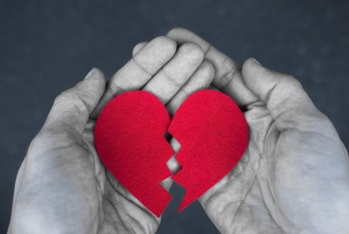
You’ve found out your partner engages in narcissistic behaviors. It does not feel good, but you have some sense of relief in feeling validated for the confusion you have been feeling in your relationship. You decide to leave your partner. You’ve had enough.
You have done all of the right things. You have blocked your narcissistic partner on your phone, social media, email, and even decided to take a break from anyone you mutually kept in touch with. However, you are left with broken pieces of yourself. The effects of your relationship seem to haunt you. Why does the narcissist feel so present when they are not even there?
Do you still feel anxious and/or depressed?
Do you feel as if you are no longer able to trust others or even yourself?
Do you feel like you no longer know who you are anymore?
Do you feel isolated and feel that no one fully understands what you have just been through?
Do you frequently blame yourself for not being able to “see” before?
You are not alone. The effects of narcissistic abuse can have a lasting impact on a person’s worldview. It is not unusual for victims of narcissistic abuse to develop some form of trauma or PTSD.
Victims of narcissistic abuse can also easily fall into a pattern of blaming themselves for what has happened. It is important to be kind to yourself during this time. It is easy to get caught up in thoughts trying to figure out what happened, how you ended up here, and what you could have done.
While we can hope that removing the narcissist from our lives will make us feel whole again, it is important to acknowledge that the effects of narcissistic abuse have impacted you significantly in ways that may not be obvious to you. While you know you did the right thing by ending a relationship with a narcissist, the after effects of narcissistic abuse are painful and confusing. Perhaps by the time you have realized you were in a narcissistic relationship, the damage has already been done.
Here are some common effects of narcissistic abuse:
Low Self-Esteem: Narcissists often engage in tactics that undermine the self-esteem of their victims. Constant criticism, belittling, and invalidation can lead to feelings of worthlessness and self-doubt.
Anxiety and Depression: The constant stress and emotional turmoil caused by narcissistic abuse can lead to anxiety and depression. Victims may experience panic attacks, mood swings, and self-doubt.
PTSD (Post-traumatic Stress Disorder): In severe cases of narcissistic abuse, victims may develop symptoms of PTSD. This can include flashbacks, nightmares, and hypervigilance, all of which are associated with trauma.
Isolation: Narcissists often isolate their victims from friends and family, making them dependent on the narcissist for support and validation. This isolation can lead to loneliness and a sense of helplessness.
Self-Doubt: Gaslighting is a manipulative tactic where the abuser denies their abusive behavior or distorts the victim’s perception of reality. This can lead to confusion, self-doubt, and a feeling of being “crazy”.
Emotional numbness: some victims of narcissistic abuse may become emotionally numb as a defense mechanism. They may detach from their feelings to cope with the constant emotional turmoil.
Health Problems: the chronic stress associated with narcissistic abuse can lead to physical health issues, including headaches, digestive problems, and even chronic pain conditions.
Difficulty trusting others: victims of narcissistic abuse often have a hard time trusting others in the future. They may be wary of forming new relationships or struggle with anxiety.
Boundary issues: narcissists frequently violate personal boundaries, and victims may have difficulty establishing and maintaining healthy boundaries in other relationships.
Self-Blame: Victims may internalize the blame for the abuse, believing that somehow deserved or caused the narcissist’s behavior.
Financial consequences: in some cases, narcissistic abusers may control the victim’s finances, leaving them financially dependent or in a precarious financial situation.
Impaired Self-Identity: victims may lose their sense of self as they are constantly manipulated and controlled by the narcissist. Rebuilding one’s self-identity can be a significant challenge.
Difficulty in Decision-making: victims may struggle with decision-making because they have been conditioned to doubt their judgment and rely on the narcissist’s decisions.
Repeating Patterns: without intervention and healing, victims of narcissistic abuse may unknowingly repeat similar patterns in future relationships.
Here is a simple self-esteem exercise to increase your awareness of the narcissist’s impact on you.
Draw three circles on a piece of paper resembling a bullseye.
In the innermost circle, write things that you feel insecure about (i.e. my looks, intelligence, self-confidence, being weak, etc.)
Example: my looks.
In the outer circle, write messages you have received that have enforced each belief (i.e. “You’re ugly”, “You’re slow”, or even things you have heard about yourself expressed to a third party).
Example: “I see you didn’t have time to do your make-up today”, “your face would look
Perfect if you lost a few pounds”, “I can see you have been eating a lot lately”.
In the outermost circle, write the names of people that have said these things to you (i.e. myself, my mom, people at work, people at school, etc.)
Example: my partner, my family members.
In the four corners of the page, write where you think those people learned those judgments, such as society's expectations for people to look a certain way or to fit into a narrow definition of intelligence.
Example: their own parents, society’s expectations of beauty
Reflect on your answers. What do you notice about the people and things that affirm negative beliefs about yourself? Did you see yourself appear? Does your narcissist appear? What informs the people that impose negative beliefs about yourself onto you?
While reflecting, you may find yourself receiving some insights about your beliefs, where they come from, and the people that inform you of these beliefs. The idea is not to blame but rather have a better understanding of what leads you to create these beliefs about yourself. It is also important to recognize that the people that make a judgment about you have learned to make these judgments from somewhere and some experience in their own life. It can be very beneficial to process and explore the emotions that come up for you.
Individual therapy can be instrumental in helping victims of narcissistic abuse recover and heal from the psychological and emotional trauma they have experienced. Here are the ways in which therapy can be beneficial:
Validation and understanding - a therapist is fully aware of the manipulation tactics used by narcissists.
Education and Awareness - an understanding of narcissism, how it develops, and recognizing signs of narcissism.
Emotional support - therapeutic support that encourages emotion exploration.
Coping Strategies - to manage anxiety and depression.
Rebuilding Self-esteem - explore the current state of your self-esteem and explore what is preventing you from seeing your own worth.
Setting Boundaries - explore how to effectively set boundaries in ways that feel comfortable to you.
Trauma Processing - in some cases, it may be helpful to process events and experiences to have a better understanding of how we perceive the world.
Empowerment - learn how to empower yourself to make and trust your own decisions.
Changing maladaptive patterns - explore the learned patterns that are keeping you from a healthy relationship.
Relationship building - explore how to build a healthy relationship that feels secure.
Gaining closure - resolve what you have experienced through self-compassion and self-acceptance, so you can finally develop the resilience to start the next chapter of your life.Gaining closure on your relationship with the narcissist is imperative to moving on. In gaining closure, you will work towards understanding how you ended up in a relationship with a narcissist, the progression of the relationship, and what you can do to avoid getting involved with someone who may be a narcissist.
Other additional topics for exploration include:
What was it about you that made the narcissist pursue a relationship with you?
What made you stay in the relationship for as long as you did?
What informed you that you could no longer stay in this relationship?
What beliefs informed you that the toxic behavior occurring in your relationship was okay?
What are the “relationship red flags” that you learned through your relationship with a narcissist?
How can you ensure that you do not end up in a relationship with a narcissist again?
Who were you before your relationship? Who are you now?
Who would you like to be going forward?
What is blocking you from what you want to achieve?
Victims of narcissistic abuse can recover and heal from effects of narcissistic abuse, but the journey to recovery may take time and often involves professional help and a support system.
Recovery from the effects of narcissistic abuse is possible, and many survivors have gone on to lead healthy, fulfilling lives.
If you are ready for professional help with creating and exploring a new identity for yourself (sans narcissist), book an appointment with me or any number of therapists at our practice. Your unfortunate encounter with a narcissist does not have to define you.
The Center for Growth additionally holds a bi-weekly support group offering support to victims of narcissist abuse. For more information, please follow the following link:














